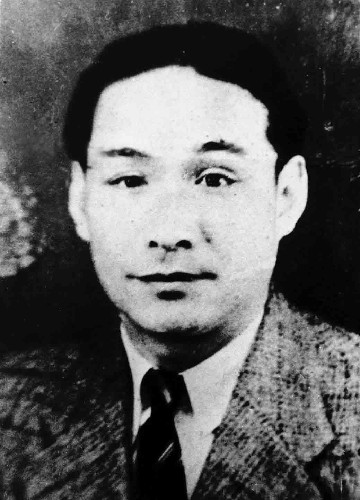Pan Hannian on:
[Wikipedia]
[Google]
[Amazon]
 Pan Hannian (; 18 January 1906 – 14 April 1977) was a major figure in the
Pan Hannian (; 18 January 1906 – 14 April 1977) was a major figure in the
解密:中共高层特工潘汉年究竟有没投靠过汪精卫
{{DEFAULTSORT:Pan, Hannian 1906 births 1977 deaths Chinese prisoners and detainees People's Republic of China politicians from Jiangsu Chinese spies Politicians from Wuxi Chinese Communist Party politicians from Jiangsu Political office-holders in Shanghai People from Yixing
 Pan Hannian (; 18 January 1906 – 14 April 1977) was a major figure in the
Pan Hannian (; 18 January 1906 – 14 April 1977) was a major figure in the Chinese Communist
The Chinese Communist Party (CCP), officially the Communist Party of China (CPC), is the founding and sole ruling party of the People's Republic of China (PRC). Under the leadership of Mao Zedong, the CCP emerged victorious in the Chinese Civil ...
intelligence by the early 1930s and until 1955. He began his work with the Chinese Communist Party (CCP) in 1926 as a propagandist
Propaganda is communication that is primarily used to influence or persuade an audience to further an agenda, which may not be objective and may be selectively presenting facts to encourage a particular synthesis or perception, or using loaded ...
with the editorial department of the magazine "Oazo" (''Huanzhou'') and later with "Crossroads" (''Shizi Jietou''). Pan became a CCP member in February 1927 and was assigned as managing editor of the "Revolutionary Army Daily" (''Gemingjun Ribao'') in Nanchang. Ordered to Shanghai
Shanghai (; , , Standard Mandarin pronunciation: ) is one of the four direct-administered municipalities of the People's Republic of China (PRC). The city is located on the southern estuary of the Yangtze River, with the Huangpu River flow ...
for the entry of the KMT in April, Pan had barely arrived when the 12 April anti-communist coup forced him underground. This may have been the time when Pan was first assigned intelligence duties. Pan escaped Shanghai with Zhou Enlai
Zhou Enlai (; 5 March 1898 – 8 January 1976) was a Chinese statesman and military officer who served as the first Premier of the People's Republic of China, premier of the People's Republic of China from 1 October 1949 until his death on 8 J ...
to Wuhan
Wuhan (, ; ; ) is the capital of Hubei, Hubei Province in the China, People's Republic of China. It is the largest city in Hubei and the most populous city in Central China, with a population of over eleven million, the List of cities in China ...
, but eventually returned to Shanghai to take up a leadership position with their paramount intelligence organization, the CCP Central Committee Special Branch (''Zhongyang Teke'', CCSB). He became the head of CCSB's Second Section (intelligence) and later the Third Section (Red Squads), in 1931-33 stayed on in Shanghai as the rest of Central Committee was evacuated under intense pressure from KMT intelligence and police in the Shanghai International Settlement
The Shanghai International Settlement () originated from the merger in the year 1863 of the British and American enclaves in Shanghai, in which British subjects and American citizens would enjoy extraterritoriality and consular jurisdiction ...
and the Shanghai French Concession
The Shanghai French Concession; ; Shanghainese pronunciation: ''Zånhae Fah Tsuka'', group=lower-alpha was a foreign concession in Shanghai, China from 1849 until 1943, which progressively expanded in the late 19th and early 20th centuries. Th ...
. Pan eventually left Shanghai in 1933 and participated in the Long March
The Long March (, lit. ''Long Expedition'') was a military retreat undertaken by the Chinese Red Army, Red Army of the Chinese Communist Party (CCP), the forerunner of the People's Liberation Army, to evade the pursuit of the National Revolut ...
, but returned to Shanghai and regularly visited Hong Kong
Hong Kong ( (US) or (UK); , ), officially the Hong Kong Special Administrative Region of the People's Republic of China ( abbr. Hong Kong SAR or HKSAR), is a city and special administrative region of China on the eastern Pearl River Delt ...
after the 1935 Zunyi Conference.
In 1949 Pan was made a Deputy Mayor of Shanghai. On 3 April 1955 Pan was accused by the PRC Ministry of Public Security of "secretly seeking the assistance of the Japanese secret service organs and colluding with the major traitor Wang Jingwei". Pan was imprisoned until his death in 1977 but was posthumously rehabilitated.
References
*David P. Barnett and Larry Shyu, eds, Chinese Collaboration with Japan: 1932-1945 (Stanford University Press, 2001), pp. 5–6 and p. 9 *Quan Yanchi, ''Secrets and Insider Stories of China'' (''Zhongguo Miwen Neimu''; Lanzhou: Gansu Wenhua Chubanshe, p. 44) *Warren Kuo, ''Analytical History of the Chinese Communist Party'', Book 2 (Taipei: Institute of International Relations, 1969), pp. 285–287.解密:中共高层特工潘汉年究竟有没投靠过汪精卫
{{DEFAULTSORT:Pan, Hannian 1906 births 1977 deaths Chinese prisoners and detainees People's Republic of China politicians from Jiangsu Chinese spies Politicians from Wuxi Chinese Communist Party politicians from Jiangsu Political office-holders in Shanghai People from Yixing